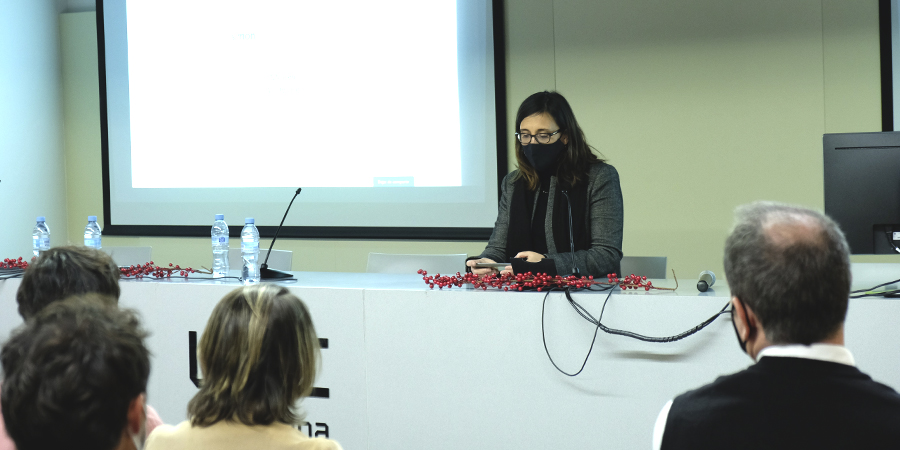- Most viewed
- Last viewed
UIC Barcelona hosts researchers and experts as they address the future, renovation and transformation of the housing sector
The conference was organised by the Laboratory of Technological Innovation for Industrialised and Sustainable Construction (LITEIS), part of the UIC Barcelona School of Architecture
On 27 January, the Delta Building Auditorium at UIC Barcelona hosted the conference “Investigación aplicada a las nuevas formas de habitar” (Research applied to new ways of living), organised by the Laboratory of Technological Innovation for Industrialised and Sustainable Construction (LITEIS) of the UIC Barcelona School of Architecture, and sponsored by the Picharchitects/Pich-Aguilera studio and the Barcelona Ceramics Chair. The event sought to offer a university- and research-based perspective on the transformations that are taking place in the built environment, particularly in terms of housing, in order to move towards a more efficient and sustainable model.
The session opened with a keynote speech by Dolores Huerta, director general of the Green Building Council Spain. In her talk titled “Emergencia habitacional” (Housing emergency), Huerta called on institutions and the construction sector to commit themselves to ensuring that, by 2050, buildings do not emit greenhouse gases and stressed that Next Generation funds can contribute to this transformation.
Her talk was followed by the round table titled “Oportunidades y dificultades en torno a los nuevos retos habitacionales” (Opportunities and difficulties surrounding new housing challenges), which was moderated by Felipe Pich-Aguilera, lecturer, doctor of architecture and member of LITEIS. Frederic Borràs, doctor of economic and business sciences and representative of Morera Asesores & Auditores; Pablo García Astrain, director of Housing, Land and Architecture of the Government of the Basque Country, and the doctor of architecture and member of LITEIS, Juan Trias de Bes, took part in the round table. The round table discussed the opportunities for change in the building sector represented by the new European funds, which involve tackling the decarbonisation of our housing supply, adapting regulations to current needs -Pablo García Astrain presented the work being done by the Basque government in this regard- making housing more flexible and providing outdoor space, as well as managing the legal and economic complexity that these challenges entail.
LITEIS research projects
Following the round table, LITEIS researchers explained some of the research projects that are being carried out in the laboratory to move towards a more sustainable and efficient model of living. Lecturer Oriol París was the first to talk and present the prototype “Climate Refab”. This is a project undertaken by students at the UIC Barcelona School of Architecture as part of the ReFAB Climate subject, which proposes an industrialised modular system to provide outdoor spaces for homes in Barcelona's Eixample district. Oriol París was joined by Juan Manuel Muñoz Gómez, specialist project consultant at Isopan, one of the industrial companies that participated in the subject, along with Manni Green Tech, Breinco and Serge Ferrari. Former student Nino Mgeladze was tasked with presenting the subject’s video summary.

Next, LITEIS coordinator and Architectural Constructions lecturer, Vicenç Sarrablo, presented his patent “Estantería de fachada” (Facade shelving) for buildings without balconies. It is a balcony system that folds up to take up little space when transported to the construction site, then, when it arrives, it is unfolded using a crane. As a result, it can be added to the façade of a building just as a shelf is put up on an interior wall.
Finally, Juan Trias de Bes, director of the hARQware Platform Chair at UIC Barcelona, spoke once again about the concepts of circular economy, housing and digital technology applied to the field of housing.
The session was brought to a close by Cristina Monforte, vice rector for Research, Innovation and Knowledge Transfer at UIC Barcelona, who concluded by saying that “the housing and building sector requires superior technology readiness level (TRL) products, and LITEIS has demonstrated that it can deliver the necessary innovation”.